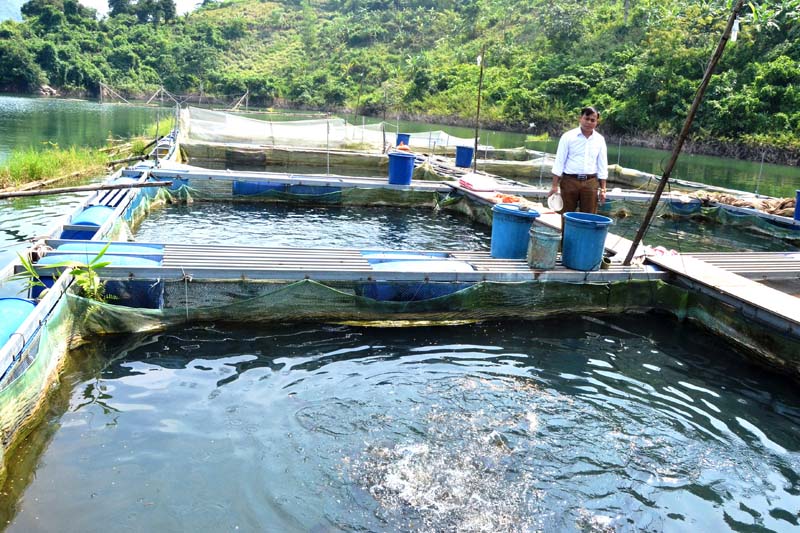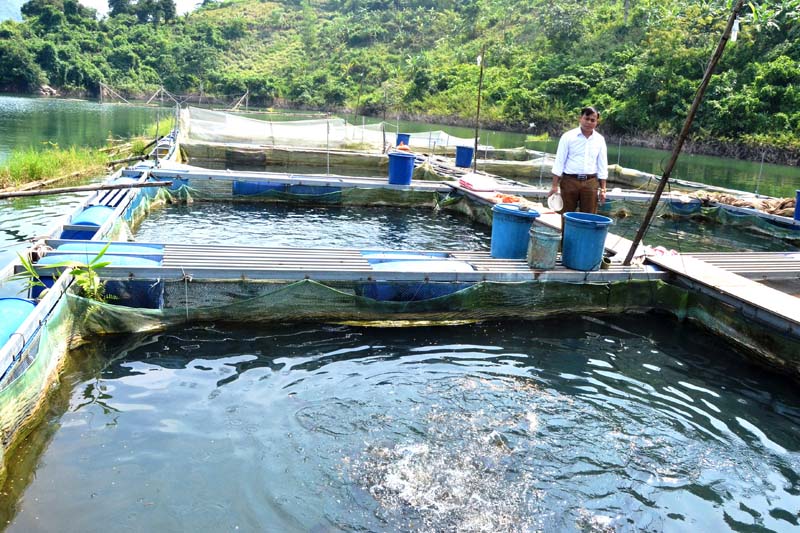
(HBO) - Fish cage farming in the lakeside communes of Hoa Binh Lake in Cao Phong district is becoming an effective direction for economic development, contributing to changing the local people's lives.

Nguyen Xuan Sang's family in Moi village,
Thung Nai Commune (Cao Phong) has expanded to 12 fish cages
According to the statistics, in the whole
Binh Thanh commune, there aree 67 cages of 23 households fishing, in which
Trang village has 20 households and 58 fish cages, accounting for 87% of
households and 86.5% of cages in the commune. It is worth mentioning that among
20 households involved in raising cage fish in Trang village, many of them are
facing difficult economic conditions and belong to poor households. However,
thanks to preferential loans and the provincial and Cao Phong district’s
policies to support the development of fish cage culture, the people in Trang
village has turned the water potential into advantage to develop fish cage
farming on the lake reservoir.
Initially, only the family of Dinh Van Linh
boldly borrowed money to invest in raising commercial fish with some special
fish such as hemibagrus, cranoglanis, pout, and black amurs. After the raising
process, its effect has been seen clearly, many people in the village have
learned and followed. Afterwards, the families of Mr. Nguyen Van Thuy, Mr. Do
Van Thuat, Mr. Bui Manh Thao, Mr. Nguyen Van Linh, etc. and many households in
the village also implemented. Some households carried out with 15 - 20 cages,
for examples: Mr. Dinh Van Linh's family with 12 cages, Mr. Nguyen Van Thuy's
family with 15 cages, Mr. Do Van Thuat's with 8 cages, Mr. Bui Van Tuan with 8
cages, Mr. Le Van Sinh with 16 cages. .
With the job of raising commercial fish
cages, it brings the income from 100-200 million VND to the households each
year. like in Binh Thanh, the local people in the lakeside villages of Hoa Binh
Lake in Thung Nai commune have boldly borrowed capital to develop commercial
cage fish farming with high economic efficiency in the recent years. like the
family of Nguyen Xuan Sang in Moi village, seeing the actual effect brought
about, his family has expanded from the original 3 fish cages to 12 cages with
high value fish. As the consumption has many advantages, after reducing all the
cost, each average fish cage can earn about 20 million VND per year.
Besides Mr. Sang's family, there are
currently 186 fish cages of 68 households in the lakeside villages such as
Tien, Nai and Moi.
According to data from the Hoa Binh Provincial Party Committee, the industrial production index for the first six months of 2025 is estimated to have increased by 20% compared to the same period last year. This marks the highest year-on-year growth rate for this period since 2020.
In the first six months of 2025, Hoa Binh province’s export turnover was estimated at 1.145 billion USD, marking an 18.11% increase compared to the same period in 2024. Import turnover was estimated at $ 804 million, a 17.15% increase, which helped the province maintain a positive trade balance.
The lives of the ethnic minority farmers in Tan Lac district have gradually improved thanks to the new directions in agricultural production. This is a testament to the collective strength fostered through the professional associations and groups implemented by various levels of the district’s Farmers’ Union.
With the motto the "product quality comes first,” after nearly one year of establishment and operation, Muong village’s Clean Food Agricultural and Commercial Cooperative, located in Cau Hamlet, Hung Son Commune (Kim Boi district), has launched reputable, high-quality agricultural products to the market that are well-received by consumers. The products such as Muong village’s pork sausage, salt-cured chicken, and salt-cured pork hocks have gradually carved out a place in the market and they are on the path to obtaining the OCOP certification.
In the past, the phrase "bumper harvest, rock-bottom prices" was a familiar refrain for Vietnamese farmers engaged in fragmented, small-scale agriculture. But today, a new spirit is emerging across rural areas of Hoa Binh province - one of collaboration, organisation, and collective economic models that provide a stable foundation for production.
Maintaining growing area codes and packing facility codes in accordance with regulations is a mandatory requirement for agricultural products to be eligible for export. Recently, the Department of Agriculture and Environment of Hoa Binh province has intensified technical supervision of designated farming areas and packing facilities to safeguard the "green passport" that enables its products to access international markets.



